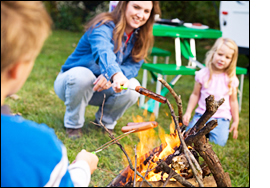Child Safety
Teach Fire Safe Behavior
Children learn by example and instruction. You are responsible for teaching them how to be fire-safe. Your guidance will encourage them to use good judgment at play and in emergencies.

Fire Safety Rules to Share With Your Children
Don’t climb on or reach over the stove for something. Children should stay away from the stove area when it is cooking time. Don’t play with matches. All matches should be stored up high, out of children’s reach. Don’t play with electrical wires or outlets. Keep appliances out of reach. Keep unused outlets covered. Don’t get close to an open fire. Always supervise outdoor fires or fire in the fireplace, and keep lighted candles always from children.
Small Children
- Always watch your children. They often play with the stove or matches and get burned when they are alone.
- Teach them to not climb across or reach onto the stove.
- Have a babysitter when you are away. Children do not react rationally to emergencies. An adult must be there to help them in case of a fire. Instruct the baby-sitter to react to fire by getting the children out fast and preventing them from trying to return. The sitter should know the escape routes from your home and the procedure for calling the fire department.
- Place all matches and lighters up high.
Older Children
- Discuss the science of combustion with your children (fire = fuel, air, heat) and safe housekeeping procedures.
- Teach responsibility. Get the children involved in weekly smoke alarm drills and develop a fire escape plan that they know well. Children in school practice fire drills so you might be surprised when they take the lead and show you what to do. Children hide when they get scared, practice will ensure everyone’s safety.
- Set a good example in the safe use and storage of matches and flammable liquids.
- Teach children to recognize the danger of clothes near heat sources, especially stove burners.
- Supervise them when they are cooking. Children often get burned when cooking alone.
- Teach children to recognize household fire hazards such as cracked wires and spilled gasoline.
- Children often get burned playing with or tending an outdoor grill or open fire. Family discussions and showing them the hazards may avert accidents.
- Supervise children while they learn tasks like tending the fireplace or filling the lawnmower.

